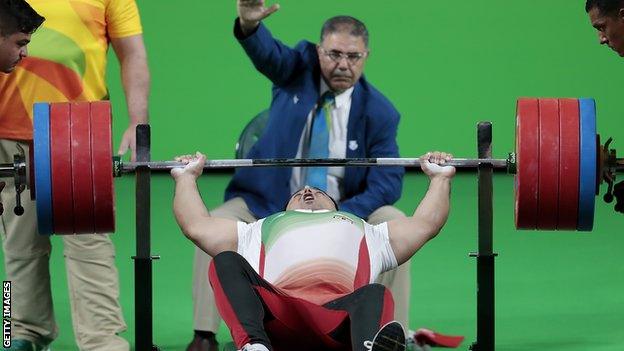Powerlifting at Tokyo Paralympics: All you need to know
- Published

Powerlifting is the the ultimate test of upper body strength
Paralympic Games on the BBC |
|---|
Venue: Tokyo, Japan Dates: 24 August-5 September Time in Tokyo: BST +8 |
Coverage: Follow on Radio 5 live and on the BBC Sport website |
Key information
Dates: 26-30 August
Venue: Tokyo International Forum
Gold medals on offer: 20
How does it work?
Paralympic powerlifting is a bench press competition, with athletes lying flat on a specially designed bench and then aiming to lower a horizontally weighted bar from arm's length to the chest and return the bar under control to the same starting position.
The three judges indicate a successful lift with white lights, and an unsuccessful attempt with red lights.
Athletes may make three lifts during the competition and must increase the weight attempted by at least 1kg following a successful lift. Each athlete has three attempts at each lift. A fourth lift may also be attempted for a record, but this does not count towards the final result of the competition.
The athlete producing the greatest result in their category - and within the three scoring competition lifts - takes gold.
In the event of a tie, the winner is the athlete that weighed in the lightest and lifted the joint heaviest weight. If both athletes have an identical body weight, a reweigh is done.
There are 10 different weight categories for both men and women. The men's classes are up to 49kg, up to 54kg, up to 59kg, up to 65kg, up to 72kg, up to 80kg, up to 88kg, up to 97kg, up to 107kg and over 107kg.
The women's classes are up to 41kg, up to 45kg, up to 50kg, up to 55kg, up to 61kg, up to 67kg, up to 73kg, up to 79kg, up to 86kg and over 86kg.
Athletes are classified by bodyweight alone, which means those with different impairments compete for the same medals. Athletes are weighed two hours before their competition.
Each competition is a straight final, although two groups are held in weight divisions where there are more than eight competitors. When there are two 'flights', or groups, these are known as A and B and are predetermined by athletes' world rankings. The B group will always lift first and the winner is on the whole most likely to come from the A group.
Who are the British medal hopes?
Zoe Newson (-41kg) has won bronze at the last two Games and is bidding to win a third medal after taking a break from the sport after Rio to have a baby. Ali Jawad (-59kg) landed silver in Rio but has to deal with the effects of Crohn's disease, an inflammatory bowel disease which has threatened his career.
Who are the other challengers?
Iran's Mansour Pourmirzaei will be making his Paralympic debut in the +107kg event, hoping to continue the legacy of compatriot and two-time Paralympic powerlifting champion Siamand Rahman, who died following a cardiac arrest in 2020. Nigeria topped the medal table in Rio and the experienced Lucy Ejike will be hoping to continue her record of winning a medal at every games since Sydney in 2000.
Did you know?
Louise Sugden played wheelchair basketball for Great Britain at Beijing in 2008 and London 2012 before switching sports in 2017 and winning Commonwealth Games silver and European gold in 2018 and she will make her Paralympic powerlifting debut in the -86kg event.
ParalympicsGB Rio 2016 medals
Two - one silver (Ali Jawad), one bronze (Zoe Newson)